
Liolaemidae are a family of iguanian lizards. They were traditionally included in the family Iguanidae as subfamily Liolaeminae, which some more recent authors prefer to delimit in a more restricted way. A common name for this group is liolaemids. Liolaemidae are typically herbivores that have a diet high in fruit. Because of this special diet, Liolaemidae have a larger small intestine when compared to other similar omnivorous and insectivorous lizards.
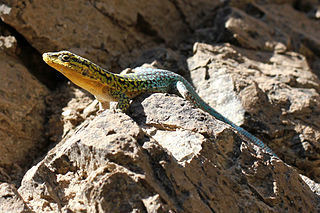
Liolaemus is a genus of iguanian lizards, containing many species, all of which are endemic to South America.

Calama is a city and commune in the Atacama Desert in northern Chile. It is the capital of El Loa Province, part of the Antofagasta Region. Calama is one of the driest cities in the world with average annual precipitation of just 5 mm (0.20 in). The River Loa, Chile's longest, flows through the city. Calama has a population of 147,886.

The Gününa küna, or sometimes, Puelche are indigenous peoples living east of the Andes Mountains in Chile and Southwest Argentina. They spoke the Puelche language. The name "Puelche" was not native, but was given to them by the Mapuche. They were annihilated by plagues and epidemics in the late 18th century, with survivors merging into other groups such as the Mapuche, Het, and Tehuelche.
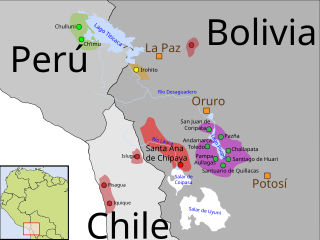
The Uru–Chipaya family is an indigenous language family of Bolivia.
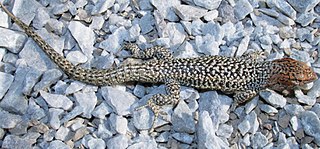
Liolaemus constanzae, commonly known as Constanza's tree iguana, is a species of lizard in the family Liolaemidae. The species is endemic to South America.
Liolaemus gravenhorstii, commonly known as Gravenhorst's tree iguana, is a species of lizard in the family Liolaemidae. The species is endemic to South America.
Liolaemus lutzae, called commonly Lutz's tree iguana, is a species of lizard in the family Liolaemidae. The species is endemic to Brazil.
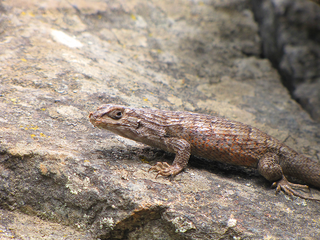
Liolaemus nitidus is a species of lizard in the family Iguanidae. It is endemic to Chile, notably within the Chilean matorral ecoregion.
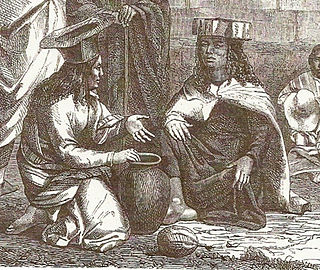
The Atacama people, also called Atacameño, are an Indigenous people from the Atacama Desert and altiplano region in the north of Chile and Argentina and southern Bolivia, mainly the Antofagasta Region.

The Chilean Matorral (NT1201) is a terrestrial ecoregion of central Chile, located on the west coast of South America. It is in the Mediterranean forests, woodlands, and scrub biome, part of the Neotropical realm.

Liolaemus chiliensis is a species of lizard in the family Liolaemidae, also referred to as the weeping or crying lizard in English. Synonyms for this species include Liodeira chilensis and Calotes chiliensis. Less commonly, it is called the Talcahuano Smooth-throated Lizard.
Macro-Paesan is a proposal linking several small families and language isolates of northwest South America. Kaufman (2007) proposes the structure at the right. Paez–Barbacoan is commonly proposed, though Curnow (1998) argued that it is spurious.
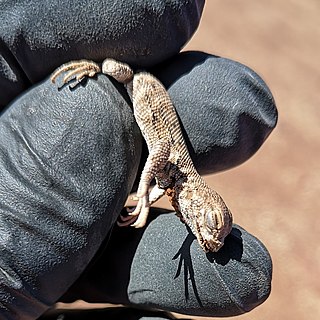
Liolaemus stolzmanni, commonly known as Stolzmann's Pacific iguana, is a species of lizard in the family Liolaemidae.

Roberto Donoso-Barros was a Chilean zoologist, naturalist, and herpetologist. Jaime Péfaur listed his birth year as 1922.

Liolaemus sarmientoi is a species of lizard in the family Liolaemidae. It is considered a medium-sized example of the family, with an average snout–vent length of 76 to 77 mm, with males usually larger than females.

Arackar is an extinct genus of lithostrotian sauropod, possibly part of the Saltasauridae, discovered in the Hornitos Formation of Atacama Province, Chile. The genus contains a single species, Arackar licanantay, described by Rubilar-Rogers et al. in 2021.
Liolaemus scapularis, the shoulder tree iguana, is a species of lizard in the family Iguanidae. It is from Argentina.













